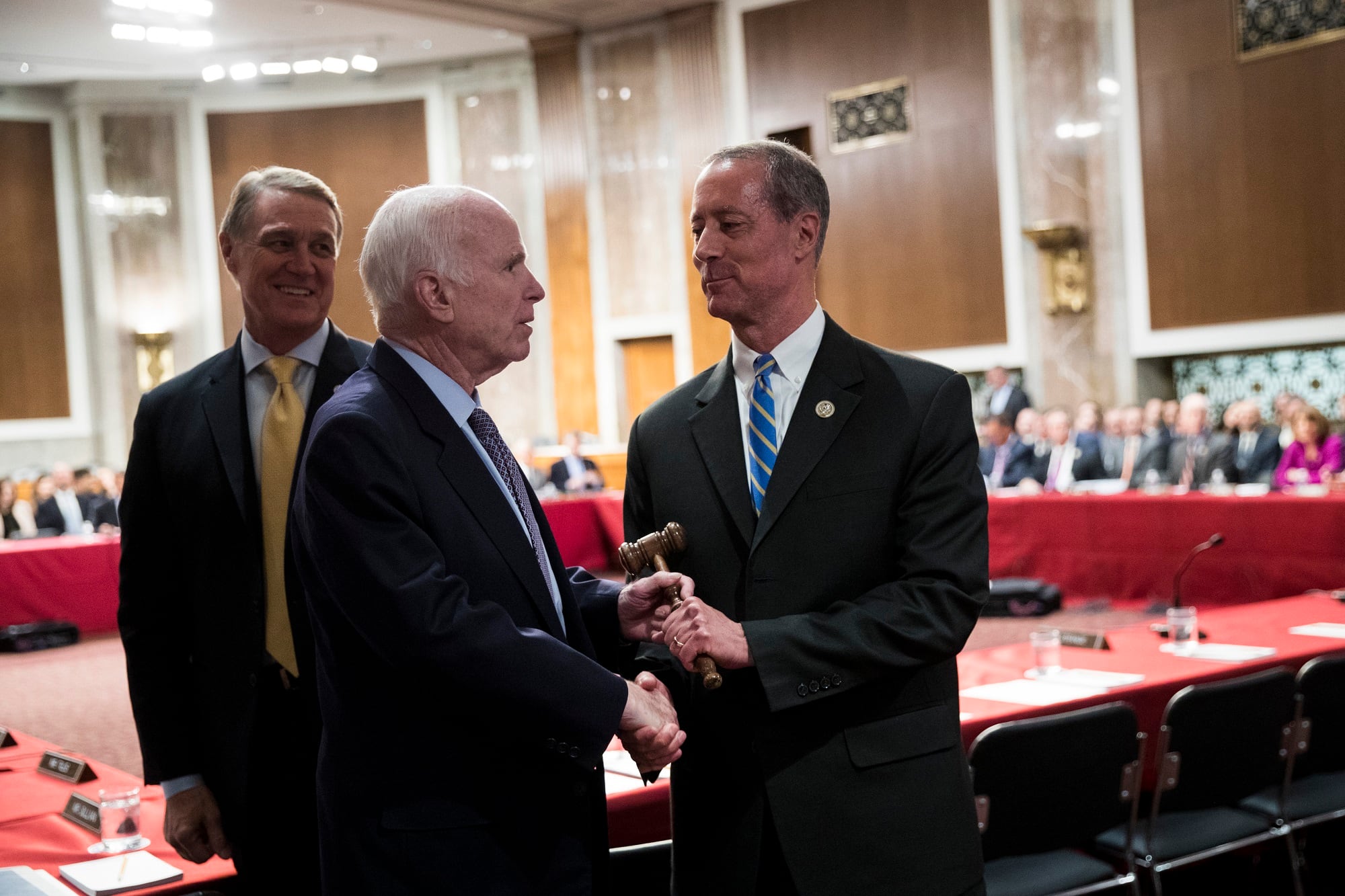WASHINGTON — The U.S. defense industry is asking Congress, as the legislative body crafts tax overhaul plans, to avoid adding to the deficit because companies are fearful that higher deficits will encourage cuts to defense spending in the long run.
The Aerospace Industries Association, or AIA, is calling on lawmakers to “get to as close to a revenue-neutral tax plan as possible, given the political environment,” said its vice president for legislative affairs, Doc Syers.
“As deficits increase, both chambers of Congress and the president have shown proclivities towards budgets that reduce discretionary spending,” Syers said Thursday. “I would expect pressure to increase if deficits are growing because of tax changes.”
AIA represents Boeing, General Dynamics, Lockheed Martin, Northrop Grumman and Raytheon. Its member companies make up 13 percent of the U.S. manufacturing base.
“We wanted all options to be on the table for Congress to offset the rate cuts and make tax cuts permanent,” Syers said. “It’s up to the folks who really know all the credits and loopholes and deductions to balance that load and find the best possible situation — and that’s where we find ourselves at the moment.”
The trade group is also lobbying for comprehensive tax reform that includes a competitive corporate tax rate that trades the worldwide tax system for one where U.S. firms only owe tax on domestic profits — and, critically, that the tax cuts be made permanent.
“For some of our companies, this is their top legislative priority,” Syers said. “They want the certainty that comes with permanent tax changes over a decade that allow them to make basic business decisions on investments in R&D, on whether to modernize plants, whether to do hires and which technologies to explore.”
The principles emerged after a meeting earlier this year between defense firm chief executive officers and House Speaker Paul Ryan, R-Wis., according to Syers.
The effort was previously reported by Bloomberg.
Republican lawmakers are downplaying the tension between tax cuts, defense budgets and deficits as the fractured party bands together to chalk up a big legislative win before midterm elections, while Democrats — sidelined from the GOP-only tax overhaul — are publicly accusing Republicans of hypocrisy and highlighting contradictions.
Senate Minority Leader Chuck Schumer, D-N.Y., said on the Senate floor this week that “the most scolding deficit hawks have morphed into deficit doves, eschewing principle for political expediency.”
To Todd Harrison, who leads the aerospace security project and defense budget analysis at the Center for Strategic and International Studies, it’s about simple math and complicated politics.
RELATED

“There is a natural tension between tax cuts and defense budget increases because both drive up the deficit,” Harrison said. “There are limits to how much Republicans, particularly the more fiscally conservative wing of the party, are willing to increase the overall deficit. And making offsetting cuts in other parts of the budget to balance out tax cuts and higher defense spending is politically difficult because the vast majority of the remainder of the federal budget goes to Social Security, Medicare, Medicaid, and veterans benefits and services.”
A tax bill is expected to emerge in the next two weeks, likely in the House Ways and Means Committee. From there, the House and Senate are expected to move quickly, but there’s no guarantee.
A tax overhaul is a critical goal for Republicans, who cleared a crucial hurdle Thursday when the House narrowly passed the Senate’s 2018 budget resolution. By Congress’s rules, that allows the Senate to pass a tax bill with 51 votes and skirt a Democratic filibuster.
There’s a storm on the horizon in that some Republicans oppose tax cuts that aren’t offset by revenue-raising provisions, among them Sen. Bob Corker, R-Tenn. The budget projects tax cuts that could add $1.5 trillion to the deficit over 10 years, and Corker insists that $4 trillion in loopholes be closed for tax reform to happen.
“This is the Republican agenda, and to be successful, we’re going to have to all lock arms and close $4 trillion in loopholes,” Corker said. “That is where the very tough work is.”
To fast-track tax reform, the fiscally hawkish House Freedom Caucus has backed off its insistence that tax cuts be offset by $203 billion in cuts to social programs — plans that likely would have cost crucial votes of moderate Republicans in the Senate.
Rep. Mark Meadows, the House Freedom Caucus’ chairman, said earlier in the week that after GOP health care overhaul plans ran aground, it added pressure “to negotiate a little more generously” on tax reform.
“We’ve got to get something major done,” said Meadows, R-N.C.
RELATED

‘You can’t have it both ways’
Though there has historically been tension between the GOP’s pro-defense and fiscally hawkish wings, Meadows resisted the suggestion tax cuts put pressure on discretionary defense spending. Though defense generally makes up half of federal discretionary spending, the GOP’s fiscal conservatives largely call for cuts cuts on the nondefense side.
Meadows said he anticipates a “very robust” defense budget for 2018. “When they’ve been under sequestration for so long, it’s difficult to suggest we’d put downward pressure there,” Meadows said.
When pressed, Meadows said: “If you’re saying I’d rather have higher tax rates to finance my military, the answer is no.”
According to the Congressional Budget Office, deficits are due to rise over the next three decades — from 2.9 percent of gross domestic product in 2017 to 9.8 percent in 2047 — because spending growth is projected to outpace growth in revenues.
CBO has offered a number of options for reducing the deficit, some that target defense discretionary spending, including cuts to the size of the military, cuts to Defense Department operations and maintenance appropriations, and cuts to various shipbuilding, aircraft and personnel accounts.
Though Congress has lowered taxes and increased defense spending before — notably in the early 2000s, when Republicans controlled Congress and the White House — changes in the tax code that cut revenue or add to the deficit do generally tend to reduce headroom for defense spending, said Katherine Blakeley, of the Center for Strategic and Budgetary Assessments.
Blakeley noted that the $1.5 trillion in deficits that the planned tax cuts would incur coincidentally equate to annual defense spending increases championed by congressional defense hawks and Pentagon leaders.
“Would tax changes take up that oxygen?” Blakeley offered.
Still, the Republican chairmen of the House and Senate Armed Services committees would not publicly acknowledge defense spending and tax reform could be at odds with each other.
“Revenue goes down, economic growth goes up, you know,” said HASC Chairman Mac Thornberry, of Texas. “How I look at it is: What do we need to do in the world [militarily] and how do we support the men and women who are risking their lives? We need to do that. Everything else is secondary.”
SASC Chairman John McCain, of Arizona, was a holdout on the Senate budget over increased defense spending, but he ultimately voted for it, he said, “because it provides the Senate a path forward on tax reform.”
McCain on Wednesday insisted tax reform and defense spending “are separate issues.”
“We have a military where we’re losing men and women’s lives because we haven’t funded them for training and equipment,” he said. “That has nothing to do with tax cuts.”
Democrats have accused fiscal conservatives of hypocrisy for advancing plans that would drive up the debt.
Tax cuts do indeed add pressure on future defense budgets, said Sen. Dick Durbin, the chamber’s No. 2 Democrat and the top Democrat on the Senate Appropriations Defense Subcommittee.
“Of course they do, particularly if they increase the deficit, the debt of this country; it makes it more difficult to talk about investing more in the military,” he said.
“You can’t have it both ways. You can’t give a tax cut to big corporations and wealthy individuals, take the money out of the Treasury to do that and expect to have plenty to spend on defense, let alone nondefense.”
The HASC’s top Democrat, Rep. Adam Smith, D-Wash., and a voice for restrained defense spending, offered a lengthy and blistering critique of what he called the GOP’s “dishonesty, hypocrisy and simple bad math.”
The gist is after Congress has passed successive tax cuts over many years, Republicans have yet to offer legislation to cut federal spending, Smith said. To boot, the GOP-led House passed defense appropriations that blow past statutory budget caps by $91 billion for defense without a plan to ease the caps.
“They will put us so far in debt that they will cripple us economically in order to pay for the tax cuts,” Smith said, “and then they will also vastly increase defense spending because they just don’t care.”
Joe Gould was the senior Pentagon reporter for Defense News, covering the intersection of national security policy, politics and the defense industry. He had previously served as Congress reporter.








